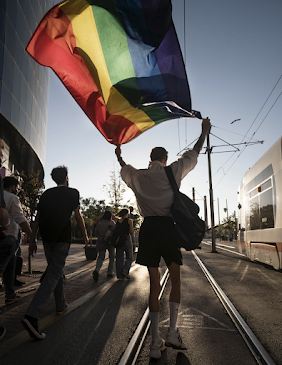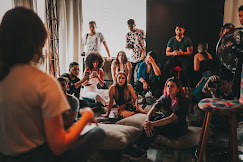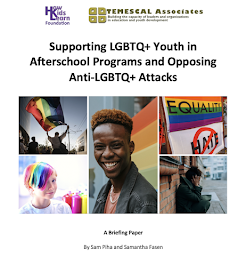 |
| Source: www.pexels.com |
By Sam Piha
When it comes to LGBTQ+ issues, those of us in California live in somewhat of a progressive bubble. To learn more about how leaders are responding to the recent political attacks on LGBTQ+ youth, we interviewed leaders residing outside of California to hear their views. We continue our interviews with these leaders below.
How can we support LGBTQ+ youth amid these attacks?
“Converse with the community! Educate those who are not aware of the harmful laws that are being placed and help them understand that this will not stop with us; this goes beyond our community. Reassure the youth that you will do your part and actively engage to do better for their community.” – Rex Barnes, Florida
“Be a visible advocate and accomplice. Demonstrate you’re a supportive person by introducing yourself with your pronouns, incorporating LGBTQ+ themes and figures into your programming, and allowing space for them to process their feelings. Know and share local resources and supports and find ways for them to connect to others who share their identities.” – Nat Duran, Illinois
What can we do to promote pro-LGBTQ+ policy and/or youth program practice?
“Contact local organizations in your region or state that combat current legislators who are trying to silence our voices and ask them how you can get involved- whether by donating, spreading awareness, or even participating in marches.” – Rex Barnes, Florida
“Assess programmatic policies and procedures for gender inclusive language and practices - including dress codes, and gender segregated spaces. Learn how to make as many options available to all participants and let them choose their own adventure. Create regular mechanisms to get feedback from youth to ensure they feel affirmed as they move throughout your program. Connect with local LGBTQ+ advocacy organizations to stay informed about local policy changes (including school boards, local government, etc.) and advocacy asks.” – Nat Duran, Illinois
“Programs can support LGBTQ+ youth by affirming them and creating inclusive spaces in which youth feel safe. Programs can provide spaces that affirm youths’ identities, using preferred pronouns and names, providing materials that represent identities of youth, addressing issues of discrimination openly and immediately when they happen. Inclusive materials can range from providing a variety of identities on a registration form to including members of the LGBTQ+ community in curriculum. Programs can further support LGBTQ+ youth by having explicit messages in program spaces that affirm that all young people are welcome and respected and creating spaces and opportunities for supportive and educational discussions led by experts that involve youth, staff, program leaders, and families. Programs should be educating their staff about appropriate ways to support LGBTQ+ youth from learning the vocabulary, acknowledging mistakes through training and conversation. Finally, be that caring adult and listen. LGBTQ+ youth, like their peers, want to feel heard and listened to without judgment can be what they need to feel supported.” – Patricia McGuiness, Massachusetts
“Everyone can take a step, large or small, to fight for LGBTQ+ rights and affirming policies in their community. In the K-12 school setting, educators, school support staff, and afterschool program leaders play a vital role in both directly supporting LGBTQ+ youth and advocating for better policies.
LGBTQ+ youth need to feel seen, heard, and loved for who they are – just like any other young person. We know that having just one affirming adult in an LGBTQ+ young person’s life is correlated with a 40% lower likelihood of reporting a suicide attempt in the past year. When LGBTQ+ young people don’t feel safe or supported at home, their only access to forming positive relationships with adults who uplift and affirm their identities is often at school or in an afterschool program. People working in the afterschool space can access resources from GLSEN and local providers of Safe Zone/Safe Space trainings to learn more about being a strong advocate for LGBTQ+ youth.
K-12 school staff and afterschool program leaders also play an important role in setting the tone for LGBTQ+ inclusion at a local level. Folks who work on the ground and in the classroom with young people can directly address anti-LGBTQ+ bullying, proactively introduce positive representations of queer and transgender people in programming, and provide LGBTQ+ young people with access to resources and direct services to improve their health outcomes and help them to feel included. People who work with LGBTQ+ youth can also monitor their local school board meetings and advocate for best practice policies like introducing school Gender Support Plans, updating school dress codes, and making sure transgender students have access to restrooms and locker rooms matching their gender identity. There are lots of other ways that individuals can take action to stop these harmful bills. The Trevor Project has a great list of opportunities to get involved here.” – Brennan Lewis, North Carolina
Who is responsible for these attacks?
“Culturally conservative community members on the far right have been organizing for decades now against bodily autonomy. Queer and trans youth leadership programs (such as Gender Justice Leadership Programs) and GSA networks across the country are leading efforts to protect, uplift, and support LGBTQ+ young people.” – Nat Duran, Illinois
“Many of the attacks on the LGBTQ+ community are a coordinated effort by far-right national political organizations like the Alliance Defending Freedom and Moms for Liberty. The Southern Poverty Law Center tracks these organizations as anti-LGBTQ hate groups.
National LGBTQ+ organizations like the GSA Network and GLSEN offer invaluable resources for afterschool leaders and educators to better support LGBTQ+ students and take action against harmful policy at the state and local level.” – Brennan Lewis, North Carolina
MORE ABOUT…
Rex Barnes (he/they) is the Youth & Family Services Coordinator at Compass LGBTQ+ Community Center in Lake Worth Beach, Florida. Compass is one of the largest gay and lesbian community centers in Florida and the Southeast United States and one of the largest and most respected of its kind in the nation. More than 25,000 people utilize its 14,000 square foot facility, and more than 17,000 referrals are fielded by more than 12,000 volunteer hours graciously contributed by hundreds of community-centered individuals each year.Nat Duran (they/them) is a compassion-led and dedicated educator focused on community building and social justice across various realms of youth work. Nat has been a champion for putting youth voice to action throughout their career within school, housing, and advocacy settings; most recently they served as the Youth Engagement Manager for the Illinois Safe Schools Alliance providing statewide leadership for the safer schools movement. In addition to their role at Constellation Collective, Nat teaches within the Youth Development Masters program at University of Illinois at Chicago.Patricia McGuiness-Carmichael MSW (she/her) is a Research Associate at the National Institute on Out-of-School Time (NIOST). Patricia has an extensive background in youth development and family engagement practice, research, and evaluation. She has worked in school and community based out-of-school time (OST) programs, creating and facilitating Social Emotional Learning (SEL) curricula, and coaching OST programs to integrate SEL into their everyday practices. Patricia participated as a National After School Matters Fellow contributing to research in the OST field. She has a background in evaluation of education initiatives, such as Reading First in South Carolina, treatment programs with Children’s Hospital Boston, and OST programs in and around Boston. As a Licensed Certified Social Worker (LCSW), Patricia began her career in the mental health and juvenile justice field before focusing on roles in prevention. Brennan Lewis (they/them) is Equality North Carolina's Education Policy Associate. They manage Equality NC's programs serving youth, students, and families, including the statewide Rural Youth Empowerment Fellowship. Previously, they served as the Regional Manager for the U.S. & Canada at Peace First, a global nonprofit that coaches and funds young people to create social action projects. Through work with Peace First, Equality NC, and as the founder of the Raleigh-based LGBTQ youth group QueerNC. Brennan is dedicated to mobilizing young people to lead change both in North Carolina and globally. They envision helping to build a North Carolina that elevates the voices, work, and lives of LGBTQ youth.To see additional tools to ensure a sense of safety for all youth, see our Youth Development Guide 2.0 here. Also, we’ve developed a series of LIAS Blogs and a new briefing paper on supporting LGBTQ youth. Feel free to share these resources with your network.
























